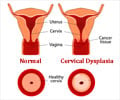
‘This systematic review highlights the need to diversify strategies that are used to improve implementation for cervical cancer prevention programs.’
Tweet it Now
While cervical cancer - one of the most common cancers in women - has significantly decreased in the United States, it is still the second most common cancer in women who live in less developed countries, according to the World Health Organization. In a study from the University of Pennsylvania School of Nursing (Penn Nursing), researchers evaluated implementation strategies used to improve the uptake and sustainability of cervical cancer prevention programs in SSA. Insight from the study has potential to improve understanding of how to scale up and evaluate new and existing programs and use them to overcome barriers to treatment and prevention for these women.
"We undertook this review in an attempt to enter cervical cervical cancer prevention into the implementation science conversation. The necessary evidence and tools for prevention exist but are not translating easily into practice and reaching the most vulnerable, at-risk women," said Lauren G. Johnson, Ph.D, lead author of the article published in Implementation Science. Johnson performed this research review while a doctoral student at Penn Nursing.
Implementation science is an emerging field that explicitly studies the processes of implementing evidence-based programs in clinical and public health settings to achieve improved patient and population health outcomes. Implementation strategies are instrumental in bridging the gap and improving the speed and rigor of research translation.
By reviewing 53 studies well represented in all regions of SSA, the research team identified a need to diversify strategies that are used to maximize the number of women reached in the region with cervical cancer prevention programs. "Education is important, but simply disseminating information in isolation is not very effective in generating change. Our study indicated a need for additional organizational and structural support to adequately sustain implementation and further improve cervical cancer prevention in sub-Saharan Africa," said Johnson.
Advertisement















